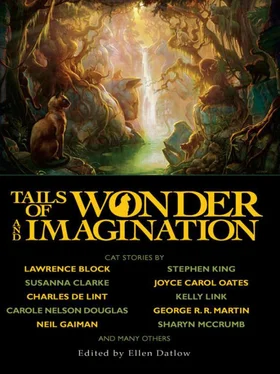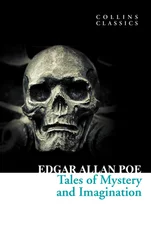Ellen Datlow - Tails of Wonder and Imagination
Здесь есть возможность читать онлайн «Ellen Datlow - Tails of Wonder and Imagination» весь текст электронной книги совершенно бесплатно (целиком полную версию без сокращений). В некоторых случаях можно слушать аудио, скачать через торрент в формате fb2 и присутствует краткое содержание. Год выпуска: 2010, ISBN: 2010, Издательство: Night Shade Books, Жанр: Фэнтези, Фантастика и фэнтези, Ужасы и Мистика, на английском языке. Описание произведения, (предисловие) а так же отзывы посетителей доступны на портале библиотеки ЛибКат.
- Название:Tails of Wonder and Imagination
- Автор:
- Издательство:Night Shade Books
- Жанр:
- Год:2010
- ISBN:978-1-59780-170-6
- Рейтинг книги:5 / 5. Голосов: 1
-
Избранное:Добавить в избранное
- Отзывы:
-
Ваша оценка:
- 100
- 1
- 2
- 3
- 4
- 5
Tails of Wonder and Imagination: краткое содержание, описание и аннотация
Предлагаем к чтению аннотацию, описание, краткое содержание или предисловие (зависит от того, что написал сам автор книги «Tails of Wonder and Imagination»). Если вы не нашли необходимую информацию о книге — напишите в комментариях, мы постараемся отыскать её.
collects the best of the last thirty years of science fiction and fantasy stories about cats from an all-star list of contributors.
Tails of Wonder and Imagination — читать онлайн бесплатно полную книгу (весь текст) целиком
Ниже представлен текст книги, разбитый по страницам. Система сохранения места последней прочитанной страницы, позволяет с удобством читать онлайн бесплатно книгу «Tails of Wonder and Imagination», без необходимости каждый раз заново искать на чём Вы остановились. Поставьте закладку, и сможете в любой момент перейти на страницу, на которой закончили чтение.
Интервал:
Закладка:
TAILS OF WONDER AND IMAGINATION
Cat Stories
Edited by Ellen Datlow
INTRODUCTION
Ellen Datlow
I would like to thank Daniel Braum, Dave Hinchberger, Jacob Weisman, John Joseph Adams, John Kessel, George Scithers, Colleen Kelly, Eleanor Lang, Charles Tan, Gord Sellar, and Richard Bowes for their recommendations and encouragement.
What is it about cats? Why do they lend themselves to fiction so easily? There have been numerous anthologies of cat stories, several of them multi-volume series. There is no other animal about which writers from all genres seem to be obsessed. Mystery, horror, science fiction, and fantasy stories have been written about cats.
It’s possible that felines, thought to be domesticated by happenstance rather than intent, are considered more mysterious, and thus more interesting to write about than other animals. Canines are pretty up front about their feelings—they’re considered to be loyal, obedient, and cheerful. Dogs, the oldest domesticated animal, have anthropomorphized themselves—become more like people. Cats have done very little of that. They are still strangers in the house. The cat does what it wants and goes its own way, which conjures up the darker images of willfulness, self-interest, and mystery.
It’s said that one is a dog person or a cat person. I’ve been both. I grew up with a wonderful cocker spaniel I adored and took “exploring” in the suburban woods across from where I lived. I don’t recall seeing many cats. All I knew of these mysterious creatures was that they chased and ate mice in the weird, silent, black and white, very primitive “Farmer Grey” cartoons of my childhood, and that my aunt living in West Germany would write regular letters to me reporting on her cat’s antics. It, and as a result she, were always in trouble with the neighbors for its skill at killing birds.
It wasn’t until I moved to Manhattan that I acquired (through a roommate) my first cat. The roommate moved in, immediately brought home two kittens, and then fled Manhattan after a couple of months, leaving me with one kitten because her parents wouldn’t let her take both back to Ann Arbor. I was suddenly a cat owner, soon acquiring a second, older cat (who lived to be twenty-three plus), and was soon faced with my own dead or dying birds—a roof adjoining my apartment allowed my cats limited roaming area.
Since then I’ve always owned cats. Or have they owned me?
The stories herein are culled from anthologies, magazines, and collections, most published from 1980–2009, a few (such as the Lewis Carroll excerpt and the John Crowley and Stephen King stories) in the late 70s. There are stories in which cats are the heroes and some in which they’re the villains. There are domestic cats, tigers, lions, mythical part-cat beings, people transformed into cats, and cats transformed into people. There’s science fiction, fantasy, mystery, horror, and even one mainstream cat story. And yes, a few cute cats.
This is not my first cat anthology. I edited Twists of the Tale in 1996—it consisted of mostly original horror stories, three of them reprinted in this book.
THROUGH THE LOOKING GLASS
(excerpt)
Lewis Carroll
One thing was certain, that the white kitten had had nothing to do with it—it was the black kitten’s fault entirely. For the white kitten had been having its face washed by the old cat for the last quarter of an hour (and bearing it pretty well, considering); so you see that it couldn’t have had any hand in the mischief.
The way Dinah washed her children’s faces was this: first she held the poor thing down by its ear with one paw, and then with the other paw she rubbed its face all over, the wrong way, beginning at the nose; and just now, as I said, she was hard at work on the white kitten, which was lying quite still and trying to purr—no doubt feeling that it was all meant for its good.
But the black kitten had been finished with earlier in the afternoon, and so, while Alice was sitting curled up in a corner of the great armchair, half talking to herself and half asleep, the kitten had been having a grand game of romps with the ball of worsted Alice had been trying to wind up, and had been rolling it up and down till it had all come undone again; and there it was, spread over the hearth-rug, all knots and tangles, with the kitten running after its own tail in the middle.
“Oh, you wicked little thing!” cried Alice, catching up the kitten, and giving it a little kiss to make it understand that it was in disgrace. “Really, Dinah ought to have taught you better manners! You ought , Dinah, you know you ought!” she added, looking reproachfully at the old cat, and speaking in as cross a voice as she could manage—and then she scrambled back into the armchair, taking the kitten and the worsted with her, and began winding up the ball again. But she didn’t get on very fast, as she was talking all the time, sometimes to the kitten, and sometimes to herself. Kitty sat very demurely on her knee, pretending to watch the progress of the winding, and now and then putting out one paw and gently touching the ball, as if it would be glad to help, if it might.
“Do you know what to-morrow is, Kitty?” Alice began. “You’d have guessed if you’d been up in the window with me—only Dinah was making you tidy, so you couldn’t. I was watching the boys getting in sticks for the bonfire—and it wants plenty of sticks, Kitty! Only it got so cold, and it snowed so, they had to leave off. Never mind, Kitty, we’ll go and see the bonfire to-morrow.” Here Alice wound two or three turns of the worsted round the kitten’s neck, just to see how it would look; this led to a scramble, in which the ball rolled down upon the floor, and yards and yards of it got unwound again.
“Do you know, I was so angry, Kitty,” Alice went on as soon as they were comfortably settled again, “when I saw all the mischief you had been doing, I was very nearly opening the window, and putting you out into the snow! And you’d have deserved it, you little mischievous darling! What have you got to say for yourself? Now don’t interrupt me!” she went on, holding up one finger. “I’m going to tell you all your faults. Number one: you squeaked twice while Dinah was washing your face this morning. Now you can’t deny it, Kitty, I heard you! What’s that you say?” (pretending that the kitten was speaking.) “Her paw went into your eye? Well, that’s your fault, for keeping your eyes open—if you’d shut them tight up, it wouldn’t have happened. Now don’t make any more excuses, but listen! Number two: you pulled Snowdrop away by the tail just as I had put down the saucer of milk before her! What, you were thirsty, were you? How do you know she wasn’t thirsty too? Now for number three: you unwound every bit of the worsted while I wasn’t looking!
“That’s three faults, Kitty, and you’ve not been punished for any of them yet. You know I’m saving up all your punishments for Wednesday week—Suppose they had saved up all my punishments!” she went on, talking more to herself than the kitten. “What would they do at the end of a year? I should be sent to prison, I suppose, when the day came. Or—let me see—suppose each punishment was to be going without a dinner: then, when the miserable day came, I should have to go without fifty dinners at once! Well, I shouldn’t mind that much! I’d far rather go without them than eat them!
“Do you hear the snow against the window-panes, Kitty? How nice and soft it sounds! Just as if someone was kissing the window all over outside. I wonder if the snow loves the trees and fields, that it kisses them so gently? And then it covers them up snug, you know, with a white quilt; and perhaps it says, ‘Go to sleep, darlings, till the summer comes again.’ And when they wake up in the summer, Kitty, they dress themselves all in green, and dance about—whenever the wind blows—oh, that’s very pretty!” cried Alice, dropping the ball of worsted to clap her hands. “And I do so wish it was true! I’m sure the woods look sleepy in the autumn, when the leaves are getting brown.
Читать дальшеИнтервал:
Закладка:
Похожие книги на «Tails of Wonder and Imagination»
Представляем Вашему вниманию похожие книги на «Tails of Wonder and Imagination» списком для выбора. Мы отобрали схожую по названию и смыслу литературу в надежде предоставить читателям больше вариантов отыскать новые, интересные, ещё непрочитанные произведения.
Обсуждение, отзывы о книге «Tails of Wonder and Imagination» и просто собственные мнения читателей. Оставьте ваши комментарии, напишите, что Вы думаете о произведении, его смысле или главных героях. Укажите что конкретно понравилось, а что нет, и почему Вы так считаете.












